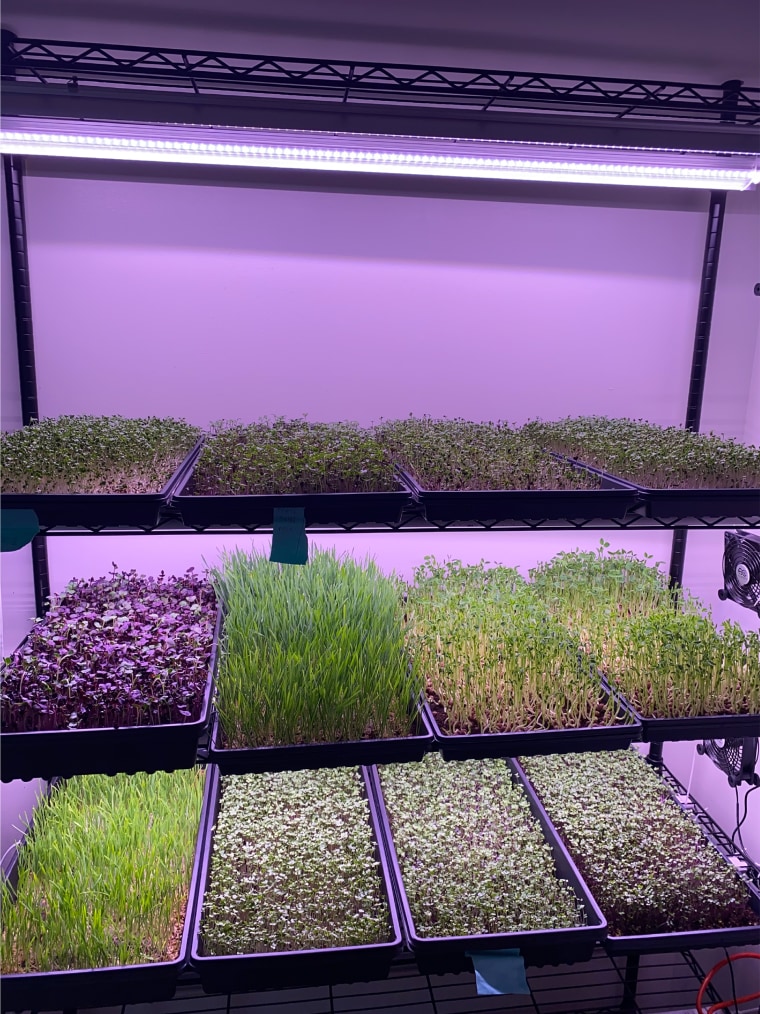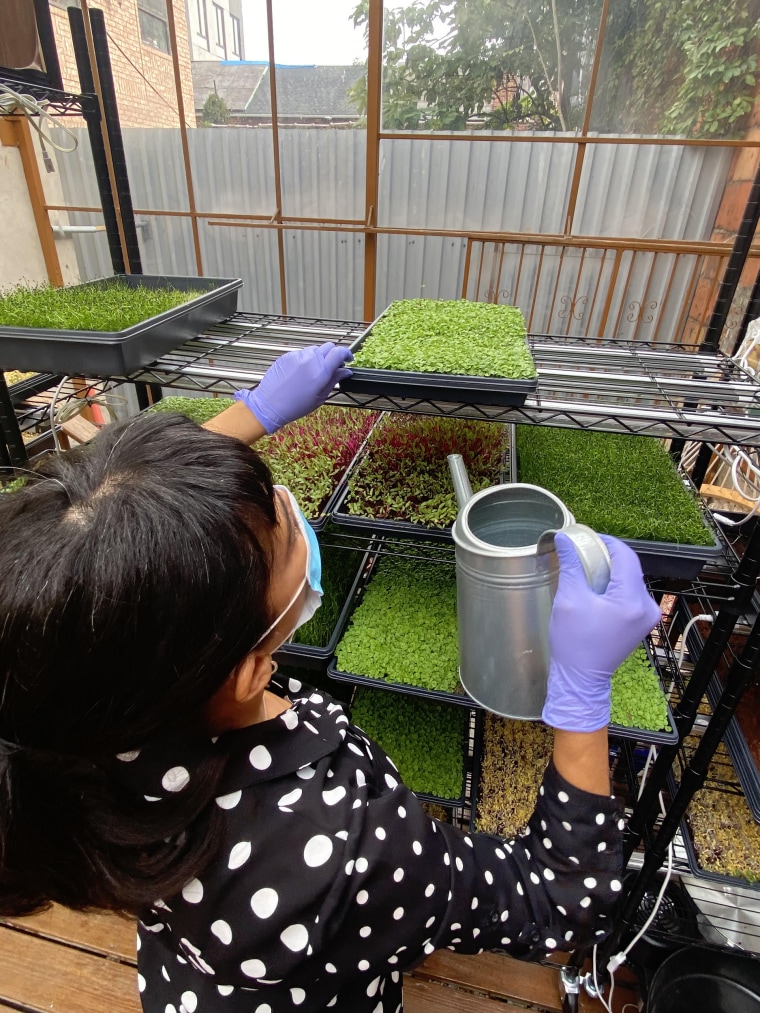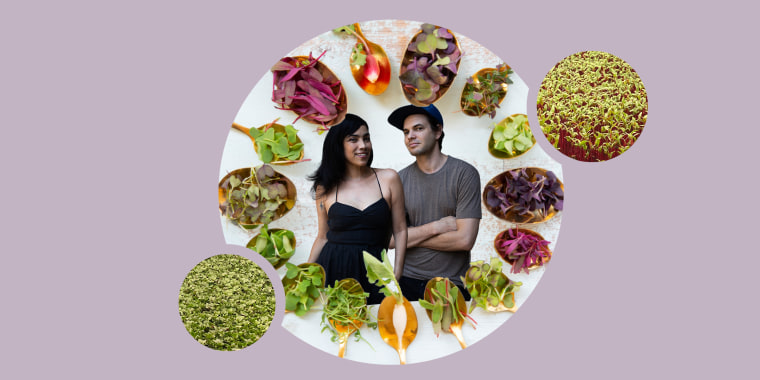Benjamin Kobin and Claudia Lake were brought together by the pandemic. Having met through mutual friends a month before stay-at-home orders began, the two began taking walks together around New York City in mid-March. Kobin and Lake found solace in each other's company on Brooklyn's cold, empty streets as well as in their mutual love for gardening.
Amid a city in crisis, when both their respective careers as a makeup artist and photographer halted, Kobin and Lake decided it was a good a time as any to create life. In April, they bought the supplies to house a hydroponic farm in Williamsburg, and by summer, as the city slowly reopened, Newtown Creek Farms was a functioning microgreenery.

"When the industry dried up we didn’t have much to fall back on," Kobin told TMRW. "We regrouped and both really liked gardening and eating healthy and vegetables. We thought this was a great opportunity to do something new, something we were passionate about."
Lake, a native New Yorker, had always contributed to a community garden while Kobin, who moved from Arizona 10 years ago, usually had some kind of fresh produce thriving on his fire escape. With their combined experience, they decided to create a farm dedicated solely to microgreens.
They named the farm after Newtown Creek, which divides Brooklyn from Queens.
"We wanted something that was super local and near us," Lake told TMRW. "Also to bring attention to this particular body of water and the local effort to bring it back to its old glory. There’s tons of manufacturing, housing and beautification going on in that area. Brooklyn is vast but our love for North Brooklyn is reflected in our name."
So, what exactly is a microgreen?
Microgreens are the shoots of leafy greens and vegetables that get harvested shortly after the first leaves develop. Think of them as baby plants. Some microgreens, like carrots, taste similar to the adult plant, while others range in flavor. Radish and lettuce microgreens, for example, often taste sweet, while kale and broccoli can be bitter and sorrel mushrooms can have a little kick with hints of lemon.
Microgreens are always more tender and delicate, but don't their stature fool you. Because they're picked so early in the growing process, these little babies are packed with nutrients.
Lake, whose father is a chef and whose grandmother is a restauranteur, grew up seeing microgreens as garnishes on top of soups and entrees. As a vegan, Lake realized these tiny greens had so many benefits — and could be used for so much more. She loves adding a big handful to salads (or as the base itself in lieu of full-grown greens) or mixed in with any veggie-based dishes. They're also great on eggs, sandwiches or tacos.
"A lot of people are not understanding health benefits. The truth is, they're 40 to 70 times as nutritious as its counter part," Lake explained.
Culinary and integrative dietitian Marisa Moore, MBA. RDN. LD, told TMRW that microgreens contain higher concentrations of antioxidants, vitamins and carotenoids compared to their fully grown counterparts, which means you can eat less of them but receive more nutrients. While microgreen varieties vary, most are particularly rich in potassium and iron.
One of the reasons Lake and Kovin decided to focus on such a vitamin-rich crop is to help New Yorkers and other urban dwellers have access to fresh produce, which aligns with a wave in activism farming and farmers fighting against system racism in the food system.
"In New York, we have a lot of food deserts — you can find fried chicken and pizza," Lake told TMRW. "All new Yorkers deserve good, quality, healthy food."
According to a study from the US National Library of Medicine Institutes of Health, scientists determined microgreens was a viable solution to provide people with necessary vitamins and nutrients in areas around the world where malnutrition is high, "even in urban settings." The study focused on broccoli microgreens grown using hydroponics and compost indoors, as Newtown Creek Farms does.

Newtown Creek Farms officially launched in July and now the microgreens are used in a few local restaurants and a deli where folks can purchase the product to bring home. But Kobin says they're in a great place to expand. The quick seed-to-harvest turnover makes it easy to grow more plants, albeit a delicate process monitoring how much water to use and when to pick plants for peak flavor.
"You can grow something fresh and nutritious in two weeks or less from seed to harvest — some in seven days," he said. "We grow them vertically, which is great when space is limited ... using wire racks that you find in a restaurant kitchen."
Since launching their farm, Kobin and Lake moved it to a larger live-work warehouse in the Bushwick neighborhood of Brooklyn with plenty of space to grow their microgreens and the business. By winter, they plan to contribute to CSA that will offer folks access to fresh produce during colder months in the local area. Eventually, they want to sell to farmers' markets and grocery store chains for a reasonable cost.
"We want it to be accessible to everybody," Lake said.

